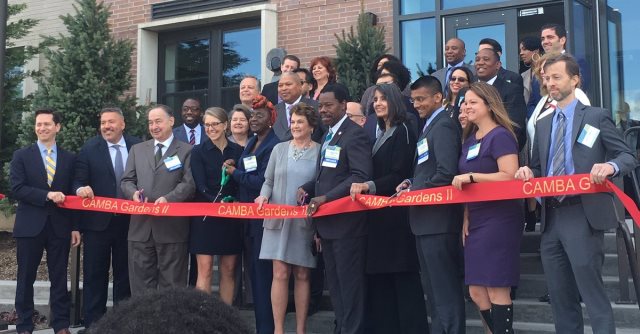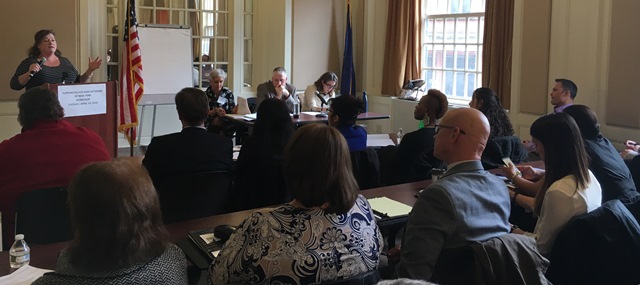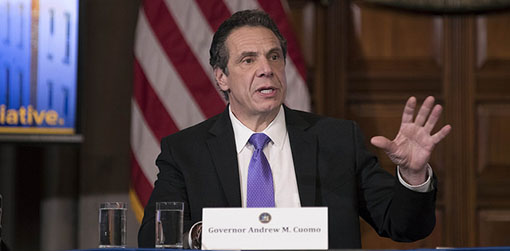

Showing Posts by Date: 04/2018
04.26.2018

City, state and private sector partners gathered on a beautiful April afternoon for the ribbon cutting of CAMBA Gardens II, a LEED Gold, 238 unit permanent, affordable and supportive housing development in the East Flatbush/Wingate neighborhood of Brooklyn. The project is built on the NYC Health + Hospitals/Kings County campus in what is an exemplary partnership between a public hospital, a nonprofit community developer and community stakeholders.
“Projects like these are about our shared goals. We do this so families are not making choices between food and housing, and are able to get the health care they need,” said Ruth Anne Visnauskas, Commissioner/CEO of NYS Homes and Community Renewal.
CAMBA Inc. CEO, Joanne M. Oplustil welcomed the audience and introduced all the speakers for the program that included Commissioner Samuel D. Roberts from the NYS Office of Temporary and Disability Assistance (OTDA); Dr. Dave Chokshi, Vice President and Chief population officer at the NYC Health + Hospitals; Council Member Dr. Mathieu Eugene; Deborah DeSantis, CEO of the Corporation for Supportive Housing; Victoria Rowe-Barreca from Enterprise Community Partners.; Matthew Schatz from TD Bank; Maurice Coleman from Bank of America Merrill Lynch; and Daniel J Randall from Federal Home Loan Bank of New York.
“This gathering is a testament to the efforts of all of us. When we work together there’s nothing we cannot do,” remarked Council Member Eugene.
Dr. Dave Chokshi spoke to the importance of supportive housing in providing health care to the most vulnerable New Yorkers.
“As a primary care physician, I know that housing is medicine. Supportive housing provides the stability that people need to be able to live their healthiest,” he said.
The star of the show though was Clarissa Martin, one of the supportive housing tenants who brought the crowd to tears with her story of finding her way out of homelessness to living in CAMBA Gardens II.
“Coming out of the shelter system, I wasn’t fed spiritually, mentally, or medically. They had me in a shared apartment with two active addicts…and I am in recovery,” she told the audience. “Being here is like a bridge back to my life. That’s what it is for me.” she added.
CAMBA Inc.'s on-site staff works with all residents to develop customized service plans for independent living skills training, financial literacy, job readiness, substance abuse, and group social, cultural, and sporting events. Other services such as case management, supportive counseling, coordination of health care and education, nutrition and fitness classes, recreational/family activities, and computer training are also available to all tenants and are funded by the New York State Office of Mental Health, New York City Human Resources Administration, HIV/AIDS Services Administration, and the New York City Department of Health and Mental Hygiene.
The project came together through a mix of private and public funding provided by NYS Division of Housing and Community Renewal, NYC Department of Housing Preservation and Development, NYS Homeless Housing Assistance Corporation, New York City Council Member Dr. Mathieu Eugene, Brooklyn Borough President Eric Adams, NYS Office of Temporary and Disability Assistance, Bank of America Merrill Lynch, TD Bank, the Federal Home Loan Bank of New York and the New York State Research and Development Authority.
CAMBA Gardens II was designed by Dattner Architects and the contractor was Bruno Frustaci Contracting, Inc.
In the News: CAMBA Debuts $100M Brooklyn Affordable Housing
04.26.2018

The Federal Home Loan Bank of New York has long been focused on using its Affordable Housing Program (AHP) to help fund affordable and supportive housing projects serving low and very-low income individuals and families: the AHP has supported 1,530 projects with more than $580 million in grants, helping to create or preserve nearly 70,000 units of affordable and supportive housing.
In 2017, the Bank’s community investment staff conducted a thorough review of the AHP to determine how best to use the program to support initiatives addressing homelessness across the district, which includes New York, New Jersey, Puerto Rico and the US Virgin Islands. Through a survey of programs at the other Federal Home Loan Banks, extensive outreach with community groups and other stakeholders in the district, and consultations with industry experts, the staff gained a better understanding of several unmet local housing needs.
In particular, the Bank focused its research in the area of supportive housing for special needs populations. Bank staff sought out community groups, as well as state funding agencies with a focus on supportive housing, to understand how financing these kinds of projects may be different and more difficult than those faced by typical AHP applicants.
The Bank concluded that supportive housing is an effective model that addresses homelessness. Going into 2018, the AHP scoring review will give extra points to projects that provide supportive housing services to a range of special needs populations including people with behavioral disabilities and the formerly incarcerated. This should make these projects more competitive in the application process.
Affordable Housing Program provides member-lenders with direct subsidies which are passed on to income-qualified households through sponsoring local community-based organizations. AHP financing is combined with other funding sources to create housing for moderate-, low- and very low-income households. Program awardees receive this funding through a competitive application process. Each competing project must be sponsored by a financial organization that is a member of the Bank in partnership with a community-based sponsoring organization.
The FHLBNY has just released it 2018 Affordable Housing Program application package, which can provide up to $40,000 per unit for competitive projects. To view a description of the application, click here; to view more details on the Network’s Funding Guide, click here; to view more details on our website click here.
The Bank is continuing its efforts to seek better ways to provide housing for other populations that are in need of both housing and supportive services. In particular, Bank staff are researching the best approaches for funding projects that provide housing for youth aging out of foster care as well as seeking better ways to support housing for the district’s aging population.
The Bank looks forward to working with the Supportive Housing Network of New York and its members as we continue our research efforts and endeavor to reduce homelessness in our district.
| Funding04.23.2018

The Network hosted two panel discussions last week on the Empire State Supportive Housing Initiative (ESSHI) in advance of this year’s Request for Proposals (RFP),scheduled to be released imminently. The workshops, held in Albany and Buffalo, highlighted the ESSHI process including what what’s new in the upcoming RFP, how to access capital funding through both OTDA HHAP (Homeless Housing and Assistance Program), and HCR (Homes and Community Renewal). A robust Q&A followed with the audience covering topics such as NIMBY and siting issues, pre-development funding and clarifications on changes around the Medicaid Redesign Team (MRT) population.
The panels, moderated by the Network’s Executive Director, Laura Mascuch, were comprised of representatives from three state agencies: the Office of Mental Health (Moira Tashjian, Associate Commissioner and Chair of the ESSHI Interagency Workgroup), Office of Temporary and Disability Assistance (Rick Umholtz, Director for the Bureau of Housing & Support Services) and Homes and Community Renewal (Leora Jontef, VP of Multifamily Finance-New Construction & Sean Fitzgerald, Assistant Commissioner). In the audience were many of the state agencies also involved in the ESSHI Interagency Workgroup including NYS Office of Alcoholism and Substance Abuse Services (OASAS), NYS Office of Children and Family Services (OCFS) and NYS Office for the Prevention of Domestic Violence (OPDV). Over 150 people attended the events including a mix of nonprofit members, developers, bankers and syndicators.
Several clarifications were discussed. The new RFP will treat the Medicaid Redesign Team (MRT) category differently. Projects serving mental health, substance use disorders, HIV/AIDS, and other Department of Health subpopulations that include 30 or more ESSHI units will be required to dedicate at least 25% of those supportive units to high Medicaid users.
The panelists also clarified that ESSHI will grant extensions beyond the 12 month conditional award period for projects that have demonstrated they are further along in the development process, but they also stressed that there is no penalty for re-applying annually.
Attendees were encouraged to talk to both OTDA and HCR about possible projects early on in the process. Both OMH (Office of Mental Health) and OASAS, have predevelopment funding available that can be accessed once a conditional award is issued.
The Network wishes to thank our hosts for these events, NYS Homes and Community Renewal in Albany and Evergreen Health Services in Buffalo. Both workshops were followed by networking mixers that were robustly attended. We would also like to acknowledge and thank our funders, the Oak Foundation, the van Ameringen Foundation, Robin Hood, New York Community Trust, JPMorgan Chase, Deutsche Bank and Capital One for their generous support of the Network’s Getting to 35K Capacity Building Initiative.
| Funding, New York State, Network Events04.02.2018

The New York State SFY 2018-19 budget has passed. There are several areas of the budget that are important to the supportive housing community. Budget highlights of particular interest include:
5 Year Statewide Housing Program Funded Again
The final budget includes the re-appropriation of the $1.97 billion in capital funding for the state’s 5-year affordable and supportive housing program. A portion of this capital funding supports the first 6,000 units of the Governor’s 15 year commitment to build 20,000 supportive housing units across the state.
The additional $124.5 million was also re-appropriated for service and operating expenses for the 6,000 supportive housing units.
Homes & Community Renewal Housing Trust Fund (HTF) & Office of Temporary & Disability Assistance (OTDA) Homeless Housing Assistance Program (HHAP) Flat Funded
The Legislature accepted the Executive’s proposal to flat fund the Housing Trust Fund at $44.2 million. HHAP is funded at the Executive’s proposal of $64 million, the same level as last year.
Services Funding Increased - OTDA Homeless Housing Preventative Services Budget
Service funding for the combined New York State Supportive Housing Program (NYSSHP), Solutions to End Homelessness Program (STEHP) and Operating Support for AIDS Housing (OSAH) was funded at the Executive’s proposed amount of $36,781,000. This is an additional $1.4 million increase over last year’s budget.
Office of Mental Health Housing Funding Increased
The final budget increased funds for supported housing and single residence occupancy programs by $10 million, as proposed in the Executive Budget.
Medicaid Redesign Team Supportive Housing Program Flat Funded
The final budget funded the MRT Supportive Housing Program at the same level as last year - $170 million over 2 years ($85 million annually).
Strong Nonprofits for a Better New York Workforce Enhancements Funded at $15 million
The final budget included $15 million for human services programs related to minimum wage increases. It is unclear how the increased funding will be implemented. We are hopeful it will support OTDA funded programs.
As more information becomes available, we will keep our members updated.
On behalf of the Network, we would like to thank Governor Cuomo and his staff, the Division of Budget, the NYS Assembly (specifically, Assemblyman Cymbrowitz, Housing Committee Chair; Assemblyman Hevesi, Social Services Committee Chair; and Assemblywoman Gunther, Mental Health Committee Chair) the NYS Senate (specifically Senator Young, Finance Chair; Senator Little, Housing Committee Chair; Senator Tedisco, Social Services Committee Chair; and Senator Ortt, Mental Health Committee Chair), and all of the staff in both houses who worked tirelessly to put this budget together. We deeply appreciate your continuing commitment to supportive housing.
|